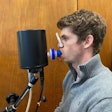
AstraZeneca’s Fasenra (benralizumab), which was recently approved by the FDA for severe asthma in children, is currently in a phase III clinical trial for COPD. According to GlobalData, the drug has the potential to address the absence of biologics in the COPD market.
GlobalData pharma analyst Asiyah Newab said the road for Fasenra to reach this stage has been a tough one: “Therapies for COPD have been in development for decades to reduce exacerbations and manage the symptom load of the disease, with a greater shift in the development of biologics. Although Fasenra has been approved for severe eosinophilic asthma, it has encountered a tough journey in meeting the primary endpoints of clinical trials for COPD.”
Fasenra underwent two phase III clinical trials in 2018, GALATHEA and TERRANOVA, for moderate to very severe COPD. Unfortunately, both clinical trials were unable to meet their primary efficacy endpoint.
“Although the data from the GALATHEA and TERRANOVA clinical trials did not reach their primary endpoint, AstraZeneca was able to supplement further clinical studies by providing insights on elevated blood eosinophil count combined with the clinical characteristics of COPD patients that could benefit from Fasenra,” Newab said. “This has led to the initiation of the phase III RESOLUTE clinical trial, which has recruited over 600 patients presenting with a history of frequent COPD exacerbations and elevated peripheral blood eosinophils and is expected to end in June 2025.”
The RESOLUTE trial evaluates the efficacy and safety of the biologic in moderate to very severe COPD patients who present with frequent exacerbations. The study is categorized into two arms, with the first consisting of the administration of the biologic subcutaneously every four weeks for the first three doses, and then every eight weeks until the end of the treatment. The second arm of the study involves a placebo comparator, taken alongside the same timeframe as the experimental biologic.
Newab said that there have been mixed opinions about the potential for Fasenra because it only targets eosinophils, which doesn’t seem to be enough in the treatment of COPD. But that doesn’t mean there couldn’t be other ways to use it.
“Despite the mixed views of Fasenra as a biologic for the treatment of COPD, it may be advantageous as a maintenance therapy for COPD patients if approved,” she said. “However, AstraZeneca’s close competitor, Regeneron/Sanofi’s Dupixent has the potential to dominate the market if the biologic receives approval following the FDA’s decision, which is expected to be announced in June 2024. At present, the COPD late-stage pipeline looks promising, representing a new age of therapies and one to keep an eye on.”























